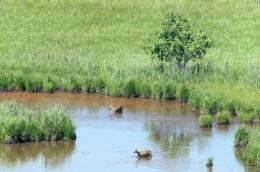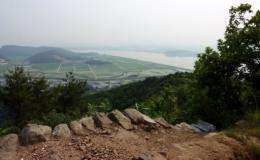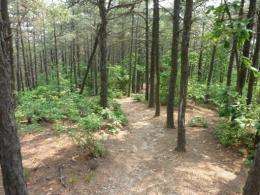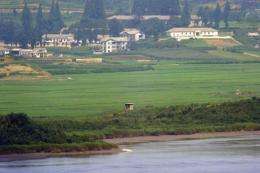Threat to wildlife haven in 'scariest place on Earth'

An unlikely and unique cradle of biodiversity that runs the length of the world's most heavily-militarised border is being threatened by encroaching development, conservation experts say.
Once described by former US president Bill Clinton as "the scariest place on Earth", the Demilitarised Zone (DMZ) that divides the Korean peninsula between North and South was created after the 1950-1953 Korean War.
Four kilometres (2.5 miles) wide and 248 kilometres long, it is a depopulated no-man's land of heavily-fortified fences and bristling with the landmines and listening posts of two nations that technically remain at war.
As a military buffer zone, it remains an area of profound Cold War hostility, but its man-made isolation has also created an accidental park recognised as one of the most well-preserved, temperate habitats on Earth.
Cutting across mountains, prairies, swamps, lakes and tidal marshes, it has become a protected home for an astonishing variety of plants and animals, including 82 endangered species such as the red-crowned crane and the Amur leopard.
Now experts attending the ongoing World Conservation Congress on South Korea's southern Jeju island, say redevelopment of land bordering the DMZ is putting the future of the wildlife haven at risk.

"The DMZ is so impressive in biodiversity in terms of its ecosystem due to its remoteness and no human impact," Uwe Riecken, director of biotope protection at the German Federal Agency for Nature told a Congress workshop.
"But on the other hand, the DMZ is facing a lot of potential threats arising from future possible access, including development," he warned.
The immediate threat is to the large strips of land that form a "civilian restricted zone" adjoining the DMZ on both sides.
Once fertile farmland abandoned after the war, the restricted zone has, over the past 60 years, reverted back to forest and natural wetlands, providing a crucial habitat for the DMZ wildlife.
"But now this is being converted back to agricultural or ginseng farms, changing the habitat of both the wild animals and plants," said Park Eun-Jin, an environmentalist at South Korea's Gyeonggi Research Institute.

Although relations between North and South remain volatile, recent efforts to reduce tensions have resulted in more permits being granted for land-use in the restricted zone.
"More pressure for inter-Korean economic development in the area is also going to pose a challenge in terms of maintaining a balance between development and preservation," Park said.
Aside from land conversion, Park said proposals for modern canals and roads would have an enormous impact on the amphibians, reptiles and birds that inhabit the area.
Experts at the conservation congress said the two Koreas would have to try to work together to prevent human resettlement of the area from disrupting the delicately-balanced ecosystem created over the past six decades.
Jeong Hoi-Seong, president of the South Korean Institute for the Environment and Civilization, said the South should consider "economic incentives" to ensure the impoverished North's cooperation.

"The South needs to find a way to incorporate economic benefits with environmental cooperation because the environment is not North Korea's priority," Jeong said.
South Korea has sought international recognition of the DMZ region as a UNESCO biosphere reserve, but the UN body has demurred, citing territorial uncertainties among other factors.
In a presentation to the congress in Jeju, the executive director of UNESCO's Natural Sciences Sector, Han Qunli, said this did not mean the area could not be granted special status in the future.
"There is a promising long-term perspective in the DMZ—once all parties are convinced—that the area could be turned from a symbol of confrontation to a bridge of connection... and a best example of biodiversity conservation," Han said.
Ironically, an enduring peace between North and South Korea could hold the biggest threat of all to the DMZ ecosystem in the form of eventual reunification of the peninsula.
If reunification were to happen before it receives the status of an internationally protected site, peace might end up destroying the very haven that war accidentally created.
(c) 2012 AFP














